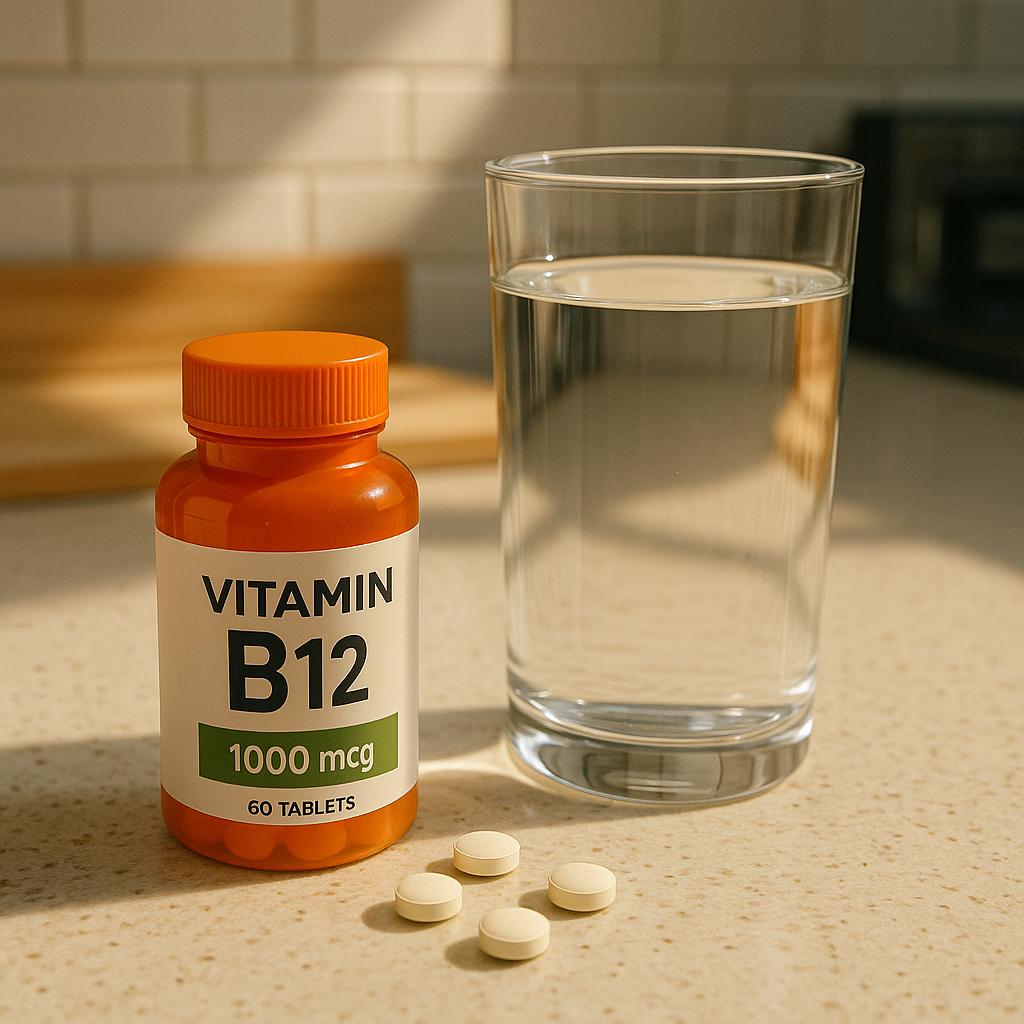Vitamin B12 can be taken either with or without food, but most experts recommend taking B12 on an empty stomach for maximum absorption, especially when using higher-dose supplements. This simple approach can help you get the best results from your B12 routine and avoid common mistakes.
Understanding the best timing for your B12 supplement is important because it affects how much of the vitamin your body actually absorbs. The right timing may depend on the type of supplement, your specific needs, and whether you’re taking other medications. In this article, you’ll find clear steps, expert advice, and up-to-date guidance so you can get the most from your B12—every time.

Why Does Timing Matter for B12 Absorption?
Vitamin B12 is a water-soluble vitamin, meaning your body doesn’t store large amounts, and you need a steady supply. Taking B12 on an empty stomach—such as first thing in the morning—can increase how much your body absorbs, especially for higher doses (NHS UK, 2024).
- With food, some absorption happens through a “carrier” called intrinsic factor, but only a small amount (about 1–2 micrograms) can be taken up at a time.
- On an empty stomach, higher doses of B12 can be absorbed passively—up to 60% more compared to taking with food (VitaRx, 2024).
Summary:
For daily maintenance (low doses), you can take B12 with or without food.
For higher-dose supplements, take B12 on an empty stomach for best results.
When Should You Take B12—Morning, Afternoon, or Night?
Best Practice: Take B12 in the Morning
Experts recommend taking B12 in the morning or early afternoon because it can help with energy and avoid any risk of sleep disruption (Verywell Health, 2024).
- Morning (empty stomach): Maximizes absorption and supports energy levels.
- Afternoon: Okay, but avoid taking with coffee or tea, which may interfere.
- Night: Not recommended, as B12 may disrupt sleep for sensitive individuals.
Should You Take B12 With Food if You Have a Sensitive Stomach?
Taking B12 With Food for Comfort
Some people experience mild stomach upset from B12 supplements, especially at higher doses. In these cases, taking B12 with a small meal or snack can help ease discomfort while still supporting absorption.
- B12 is safe to take with or without food.
- If you’re on acid-reducing medications (like PPIs or H2 blockers), taking B12 with food can help your body use its natural “intrinsic factor” to absorb the vitamin.
Can B12 Interact With Other Medications or Vitamins?
Yes. Some medications and nutrients can interfere with B12 absorption. To avoid this:
- Space B12 and vitamin C by at least 2 hours—vitamin C can reduce absorption if taken at the same time.
- Space B12 and metformin or certain antibiotics—metformin (for diabetes) and some antibiotics can interfere with B12 absorption, so take them at different times (Oregon State University, 2024).
Quick-Reference Table: B12 Timing and Absorption
| Purpose | Dose | Take With Food? | Timing Tips |
|---|---|---|---|
| Maintenance | 2–25 µg | Yes or No | Any time, stay consistent |
| Large supplement | 250 µg or more | Preferably no | Empty stomach, AM best |
| Sensitive stomach | Any | Yes | Small meal or snack |
| Medication combo | Any | Yes or No | Space by 2+ hours |
Frequently Asked Questions (FAQ)
Is it OK to take B12 with coffee or tea?
It’s best to wait at least 30 minutes after taking B12 before having coffee or tea, as caffeine may reduce absorption.
What is the best form of B12 supplement?
Both methylcobalamin and cyanocobalamin are effective, but methylcobalamin is considered more bioavailable by some experts.
Are there side effects from taking B12 on an empty stomach?
Most people tolerate B12 well, but if you feel queasy, try taking it with food.
How long does it take for B12 to work?
It can take days to weeks to feel benefits, depending on your body’s needs and your baseline B12 status.
Conclusion
For best results, take B12 on an empty stomach in the morning, unless you experience stomach sensitivity—in which case, taking it with a small meal is perfectly fine. Always stay consistent and space B12 away from medications that may interfere. For the latest recommendations or if you have specific health conditions, consult your doctor or pharmacist.
